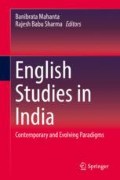Abstract
This paper illustrates the imperial design underlying the introduction of English education system in the nineteenth century. The establishment of the first three Indian universities alongside the judicial, penal and medical institutions was an attempt to bring the colonised under the ambit of disciplinary power. What this paper undertakes is to situate Shakespeare as an author function in this colonial enterprise of epistemic subjugation through English education and also to explore how he was imposed on the colonised intelligentsia as the ultimate icon of British cultural supremacy. As a postcolonial subject, it is worth introspecting how Shakespeare was used in the imperial scheme as an instrument of epistemic violence to discipline the colonised psyche towards a hegemonic acceptance of British imperialism. The efficiency of execution as well as the efficacy of this imperial agendum is evidenced by his consequent reception among the educated Indian elite along the desired colonial lines which reigned supreme, not only during the colonial era but till date, through the pedagogical practices of a large section of the Indian academia.
Access this chapter
Tax calculation will be finalised at checkout
Purchases are for personal use only
Notes
- 1.
David Lester Richardson (1801–1865) was a legendary teacher of English literature, particularly of Shakespeare’s works at the then Hindu College. In his early career, he was an officer of the Bengal Army of the East India Company. Detailed discussions on his personality, aura and contributions to imparting English education to the Indian intelligentsia of early nineteenth-century Bengal can be found in the recent volume titled Hindu College by Prasad Sengupta (pp. 345–383).
- 2.
All translations of excerpts and quotations from Swapan Chakravorty’s Bangalir Ingreji Sahityacharcha, written in Bengali, are by the author.
- 3.
Purnendu Patri also compiles the poem originally written in Bengali (85) which is preceded by a thumbnail description of the provenance and publication history of both the original and the translated versions of the composition (83). Patri (2 February 1933–19 March 1997) was an eminent intellectual of Bengal. A painter by training, he is also an eminent Bengali poet, novelist and fiction writer. He also directed many films in Bengali. He is particularly mentioned here because he was also a literary critic and an avid researcher of the nineteenth-century Kolkata life. The particular title that I mention here, i.e. Rabindranather Shakespeare, is a compilation of references, comments and assessments made by Tagore about the dramatic characters and works of Shakespeare in various essays, documents, letters and other discourses over the course of his extensive and prolific literary career, and the entries in Patri’s book are arranged thematically in alphabetical order. The book is particularly important in the context of the present discourse as it also includes an excerpt from Tagore’s “Balaka Kabya Parikrama” where the poet not only explains the context of writing the eulogy to Shakespeare cited here but also elaborates on the significance of the poem (Patri 95–96).
References
Althusser, L. (1994). Ideology and ideological state apparatuses. In J. Storey (Ed.), Cultural theory and popular culture: A reader (pp. 151–162). New York: Harvester Wheatsheaf.
Anikst, A., et al. (1989). Is Shakespeare a feudal propagandist? In J. Elsom (Ed.), Is Shakespeare still our contemporary? London: Routledge.
Bandyopadhyay, S. (2007). Macaulay and Rammohun. In S. Dasgupta (Ed.), A south Asian nationalism reader. New Delhi: Worldview.
Barthes, R. (2007). The death of the author. In D. Lodge (Ed.), Modern criticism and theory: A reader (pp. 164–168). Delhi: Dorling.
Chakravorty, S. (2006a). Bangalir ingreji sahityacharcha. Kolkata: Anustup.
Chakravorty, S. (2006b). Bangalir ingreji sahityacharcha: Suchanaparber punarbichar. In Bangalir ingreji sahityacharcha. Kolkata: Anustup.
Dotson, K. (2011). Tracking epistemic violence, tracking practices of silencing. Hypatia, 26(2), 236–257. Wiley online library. http://onlinelibrary.wiley.com/doi/10.1111/j.1527-2001.2011.01177.x/pdf. Accessed 8 November 2013.
Foucault, M. (2007). What is an author? (J.V. Harari, Trans.). In D. Lodge (Ed.), Modern criticism and theory: A reader (pp. 192–205). Delhi: Dorling.
Full text of “A book of homage to Shakespeare to commemorate the three hundredth anniversary of Shakespeare’s death”. Internet archive: Digital library of free books, movies, music & wayback machine. https://archive.org/stream/cu31924013146257/cu31924013146257_djvu.txt. Accessed 29 Nov 2013.
Gutting, G. (2005). Foucault: A very short introduction. Oxford: Oxford University Press.
Howe, S. (2002). Empire: A very short introduction. Oxford: Oxford University Press.
Kabir, H. (1956). Education in new India. London: George Allen and Unwin.
McMullan, G. (2000). Preface. In G. McMullan (Ed.), King henry VIII, All is true. London: Arden Shakespeare.
“Oh Almighty! Lead us from the unreal ...” World prayers – Prayer archive. http://www.worldprayers.org/archive/prayers/invocations/oh_almighty_lead_us_from.html. Accessed 19 Dec 2014.
Patri, P. (1989). Rabindranather Shakespeare. Kolkata: Pratikshan.
Sampson, G. (1980). Schools of linguistics. London: Hutchinson.
Sengupta, P. (2016). Hindu Kalej. Kolkata: Ananda. Print.
Viswanathan, G. (1989). Masks of conquest: Literary study and British rule in India. New Delhi: Oxford University Press Print.
Author information
Authors and Affiliations
Editor information
Editors and Affiliations
Rights and permissions
Copyright information
© 2019 Springer Nature Singapore Pte Ltd.
About this chapter
Cite this chapter
Niyogi, S. (2019). Shakespeare as an Instrument of Epistemic Violence. In: Mahanta, B., Sharma, R. (eds) English Studies in India. Springer, Singapore. https://doi.org/10.1007/978-981-13-1525-1_3
Download citation
DOI: https://doi.org/10.1007/978-981-13-1525-1_3
Published:
Publisher Name: Springer, Singapore
Print ISBN: 978-981-13-1524-4
Online ISBN: 978-981-13-1525-1
eBook Packages: Social SciencesSocial Sciences (R0)

